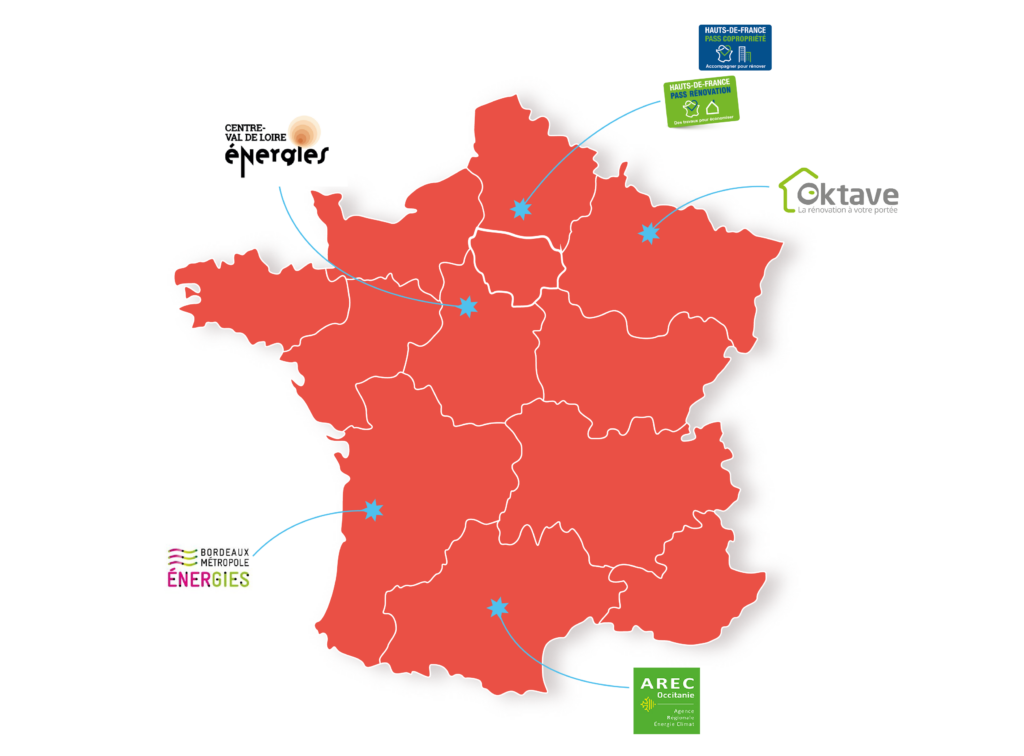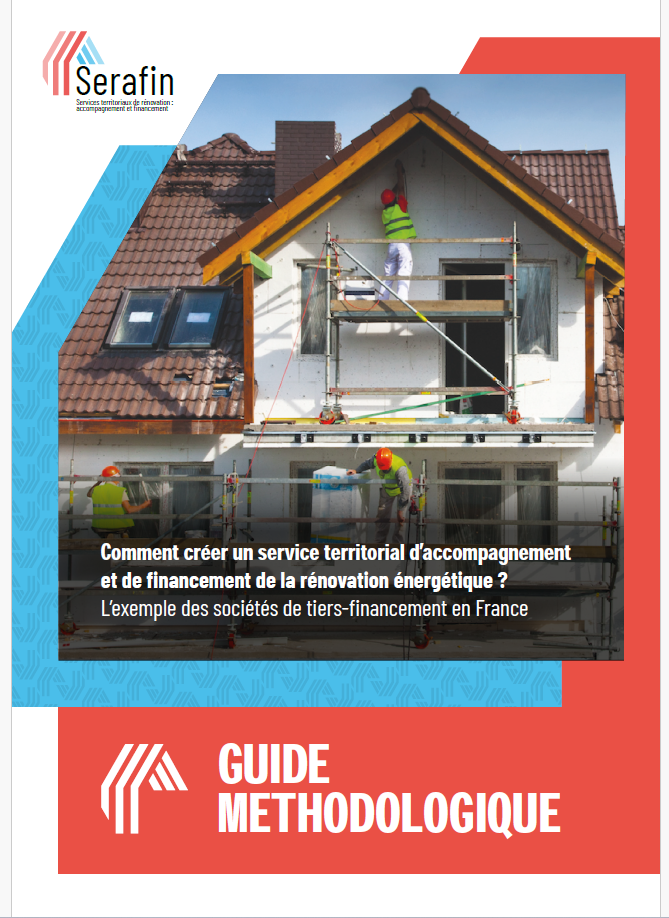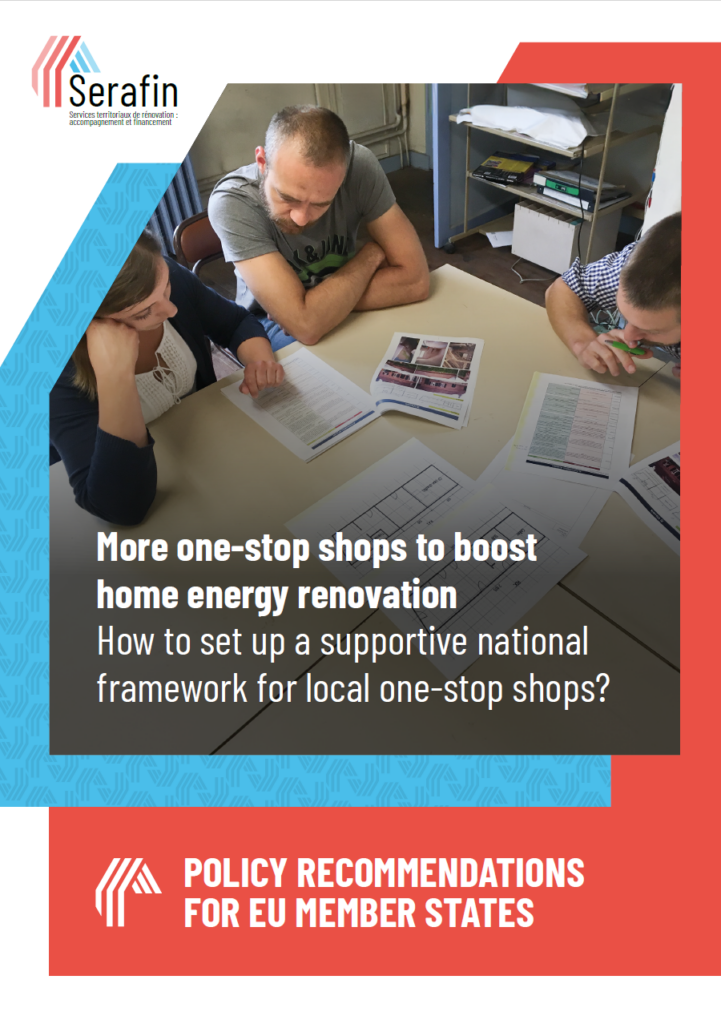The five French Third-Party Financing companies, a specific model of local one-stop shop for home energy renovation, see their activities and teams constantly growing and thriving. What is the secret behind their success? Hard work, political support, cooperation, devoted partners… so many components that helped them spread their wings and fly. Here are 5 tools and moves that could inspire their European peers.
1. Creation of the SERAFIN association: If you want to go fast, go alone, if you want to go far, go together
In the beginning of 2022, six Third-Party Financing companies joined forces with their partners and created the SERAFIN association with the objectives to:
- Share and pool resources – expertise, studies, procedures, development of IT tools, etc..
- Define a common reference framework for the quality of renovation works.
- Optimise the financing offer for their clients.
- Amplify their action at national level and contribute to the massification of global and ambitious energy renovation of housing in France.
Among the SERAFIN founders were:
- Six Third-Party Financing companies:
- Ile-de-France Energies[1].
- La Régie Régionale du Service public de l’Efficacité Energétique (SPEE) of the Hauts de France Region which develops its offer under the brand Pass Rénovation.
- Bordeaux Métropole Energies which develops its offer under the brand FaciRénov.
- Oktave in the Grand Est Region.
- Centre-Val de Loire Energies in the Centre-Val de Loire Region.
- The Regional Energy and Climate Agency (AREC) of the Occitanie Region with its service Rénov’Occitanie.
- 3 partners:
- Effinergie – the public interest association for the construction and renovation of low-energy buildings, which holds the BBC label.
- Energies Demain – a consultancy specialising in territorial public policies on energy, climate and quality of life.
- Pouget Consultants – a consultancy and engineering company specialising in the energy and environmental efficiency of buildings.

Thanks to this collaboration, SERAFIN members can boast impressive achievements for the year 2023:
- 18,000 energy audits.
- 6,160 home renovation projects representing an investment of €173.2 million.
- 1,300 loans disbursed for a total amount of €40 million.
- Average renovation cost for a single-family home: €42,500.
- Average renovation cost per condominium unit: €23,400.
Continue reading to discover the key results and benefits of this collaboration…
[1] Soon after the creation of the SERAFIN association, Ile de France region changed the mission of Ile-de-France Energies and stopped cooperating with SERAFIN. Today, 5 Third-Party Financing Companies, active members of SERAFIN, are operational in France in the housing sector.
2. SERAFIN standard reference framework for the quality of renovation works
All SERAFIN members are committed to high quality, global and ambitious renovation works achieving high energy savings. But how do they measure ‘high quality’? What do they mean by ‘global and ambitious works’? To these questions, every Third-Party Financing company (TPFC) had a different answer.
That is why they created a standard reference framework for the quality of renovation works which allowed them to gather the same data, compare their practices and comply with the commonly agreed high quality standards. More importantly, homeowners are sure to achieve estimated energy and financial savings which allow them to finance renovation works without any bad surprise at the end. For financiers and banks, the guarantee of quality is a basis for securing the repayment of loans.
The standard reference framework is built on three principles:
- The contract with homeowners guarantees the quality of renovation works via the qualification of renovation experts, respect of the performance target (BBC Renovation 2024 standard – Low Energy Renovation 2024 standard, a label defined by the French government) and technical & financial specifications.
- Standard processes for the renovation of single-family homes and collective housing, for the development of a financing plan and for the estimation of costs of works and energy savings.
- A quality and compliance approach via application protocols, accreditation process and continuous improvement of the standard reference framework.
This framework is also recognised by insurers as an effective approach to risk management. The risk of non-quality renovation is lower and thus more easily transferrable to insurance companies. By respecting these standards, companies could avoid damages caused by low-quality renovations, estimated as 10% of the turnover of the building sector, i.e. €16 billion in 2022.
>> The SERAFIN Standard Reference Framework for the quality of renovation works is not publicly available.
3. The Energy Renovation Bank: solving difficulties faced by the Third-Party Financing Companies, meeting the needs expressed by banks
The project FIDEO – Energy Renovation Bank, initiated by the SERAFIN network, aims to create a financing company specializing in the energy renovation of private housing. The company will manage and issue bank loans customised and accessible to all households, including customers with less easy access to bank financing.
The loans will be distributed via private banks and TPFC to finance renovation works complying with the SERAFIN standard reference framework for the quality of renovation works.
The advantage for involved banks is that they will operate in a controlled framework (quality, risks, costs), the loans will comply with the Green Asset Ratio and they can be integrated in the green bonds portfolios.
The advantage for TPFC is that they can concentrate on their core business (technical support to homeowners) while avoiding that the size of their balance sheets limits their growth.
The SERAFIN network members need a relay if they are to continue distributing renovation loans. On the one hand, active TPFC are seeking alternative to securitization in order to avoid excessive balance sheet growth, to streamline their systems and to limit their processing costs. On the other hand, to encourage the development of the network, new operators must be given the choice of avoiding the burden of managing direct loans.
Several banks have expressed interest in the idea of setting up a marketplace financial institution specializing in energy-efficient renovation: Procivis, Marsh, Société Générale, La NEF, Crédit Mutuel, Crédit Coopératif, Crédit Logement, BNP Paribas.
>> Read more about the FIDEO project here.
>> Read more about the financing in this article: Navigating securitization challenges and finding solutions better suited to the needs of third-party financing companies in France.
4. A methodological guide for creating a local technical and financing service for home energy renovation
The experience of TPFC in France, which is unique in Europe and has demonstrated its effectiveness, should be made available to all local authorities wishing to set up a Third-Party Financing Company or a one-stop shop for home energy renovation.
This is precisely the purpose of the methodological guide, which describes the pathways and factors for success, as well as the limits and drawbacks of setting up an integrated home renovation service. The aim of this guide is to present the existing TPFC and their role (part 1), explain how they operate (part 2), and help public players, particularly local authorities, set up a TPFC in their area if the conditions are right (parts 3 and 4). SERAFIN wants to make these elements available to as many people as possible, so that, in a near future, they become the norm in the renovation market.
It is by working together, exchanging and sharing our experience that local and regional authorities will be able to achieve both European and French renovation targets (especially with regard to poorly insulated dwellings – the so-called “thermal sieves” with an F or a G energy rating) and mobilise the banks and other institutions involved in the process, while keeping renovation costs under control.

>> Read the guide in French here
>> Read the guide in English here
>> Watch the video-presentation of the guide in French here
>> Read the interviews with the directors or technicians of the French TPFC here
5. Policy recommendations for EU Member States: How to set up a supportive national framework for local one-stop shops?
According to the European Climate Neutrality Observatory, “progress on buildings has been far too slow” and achieving the zero-emission building stock by 2050 target means Member States have no time to lose. The recent adoption of two major directives for the European Green Deal (the Energy Efficiency Directive and the Energy Performance of Buildings Directive) has given Member States a framework for reducing emissions and energy use in buildings across the EU, together with new targets, policies and tools.
Among other things, both Directives recognise one-stop shops as a major tool for boosting home energy renovation. More specifically, Article 22 § 3 of the Energy Efficiency Directive urges Member States to create a “supportive framework […] in particular for the creation of one-stop shops.”
Building on the experience and lessons learned ‘in the field’ by the five French Third-Party Financing companies, the SERAFIN association drafted key recommendations for Member States wishing to create a dream country for one-stop shops. Here is what Member States should do:
1. Ensure the coherence and long-term stability of public home energy renovation policies.
2. Make the provision of advice and support to households on home energy renovation a public service.
3. Support local and regional authorities with setting up local one-stop shops.
4. Make stable, clear and simple public funding schemes for deep renovation and the creation and operation of local one-stop shops accessible to all.
5. Make sure every citizen has access to long-term financing.

>> Take a deeper dive into our policy recommendations for EU Member States, and for France in particular, here.
The SERAFIN association was created and its activities and tools developed and shared thanks to the ORFEE project, funded by the EU’s Horizon 2020 programme. Four years of hard work will not stop at the end of the project (May 2024). The SERAFIN association continues its activities. You can follow them on the SERAFIN website and Linkedin.
SERAFIN is also involved in the European initiative EU Peers – the European Community of Practice for Integrated Home Renovation Services. SERAFIN will coordinate the French EU Peers national platform, boosting the collaboration between French one-stop shops for home energy renovation and their supporters.
